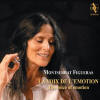Texte paru dans: / Appeared in:
*
International Record Review - January 2012
Pour
s'abonner / Subscription information

Montserrat Figueras 1942-2011
The death of Montserrat Figueras from cancer at the age of 69 has robbed the world of music – not only Early Music – of a voice of luminosity and a person of extraordinary warmth and wisdom. With her husband, Jordi Savall, she explored a vast repertoire, including Sephardic songs, Catalan folk music, Iberian Renaissance song, Monteverdi and Mozart, always with a combination of musical (and musicological) intelligence and a sense of humility in the face of great music.
She was born into a music-loving family in Barcelona and embraced music early, being involved with Enric Gispert in the establishment of the Medieval music group Ars Musicae. It was during this period that she met Savall, and the two went to study at the Schola Cantorum Basiliensis and the Music Academy in Basle, marrying in 1968.
Hespèrion XX (since the new millennium XXI), founded in 1974, became the vehicle for the couple’s artistic vision. Amongst their most striking early projects, which retain all their freshness and sense of exploration, are ‘El Barroco Español’ (1978) and the outstanding ‘Llibre Vermell’ (1978). In 1987 Figueras and Savall returned to Barcelona and founded the vocal ensemble La Capella Reial de Catalunya, with which remarkable projects devoted principally to Iberian music were undertaken, including the transcendently beautiful ‘Cant de la Sibil.la’, recorded in 1988, in which Figueras’s voice was the central focus. In the same year they recorded Monteverdi’s Vespers, and in 1991 Mozart’s Requiem, to both of which Figueras’s velvet singing brought something completely new. During this period they also kept up a non-stop schedule of performing and recording large swathes of the Iberian Renaissance repertoire, both sacred and secular, which formed the linchpin of their work.
In 1998 Figueras and Savall founded their own label, Alia Vox, often revisiting repertoire they had worked on before for EMI and Astrée, but also developing into new areas – the lullaby disc ‘Ninna Nanna’ contains not only Early and folk music but new pieces by Arvo Pärt – and developing projects that are both recording and book, devoted to themes such as Columbus, Cervantes and the Borgia Dynasty, and increasingly to inter-cultural exchange in such projects as ‘Jerusalem’ and, most recently, ‘La Sublime Porte – Voix d’Istanbul’.
Figueras was awarded numerous distinctions during the course of her life, receiving for her recordings the Grand Prix de l’Académie du Disque Français, the Edison Klassik and the Grand Prix de la Nouvelle Académie du Disque. In 2003 the French government made her an Officier de l’ordre des Arts et des Lettres, in 2008 she and Savall were appointed Artists for Peace by UNESCO and in 2011 she was awarded the Creu de Sant Jordi by the Catalan Government, and won a Grammy for the ‘Dinastia Borgia’ book-CD.
Montserrat Figueras is survived by her husband and their children, Arianna and Ferran Savall, with both of whom she collaborated professionally.
Ivan Moody
Cliquez l'un ou l'autre
bouton pour découvrir bien d'autres critiques de CD
Click either button for many other reviews


